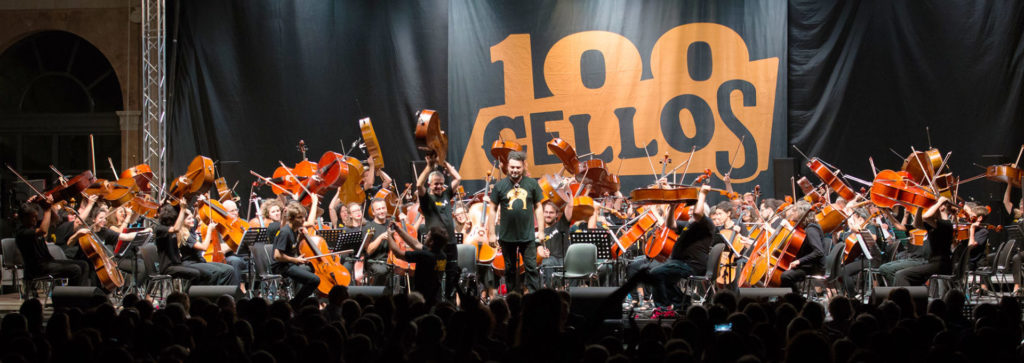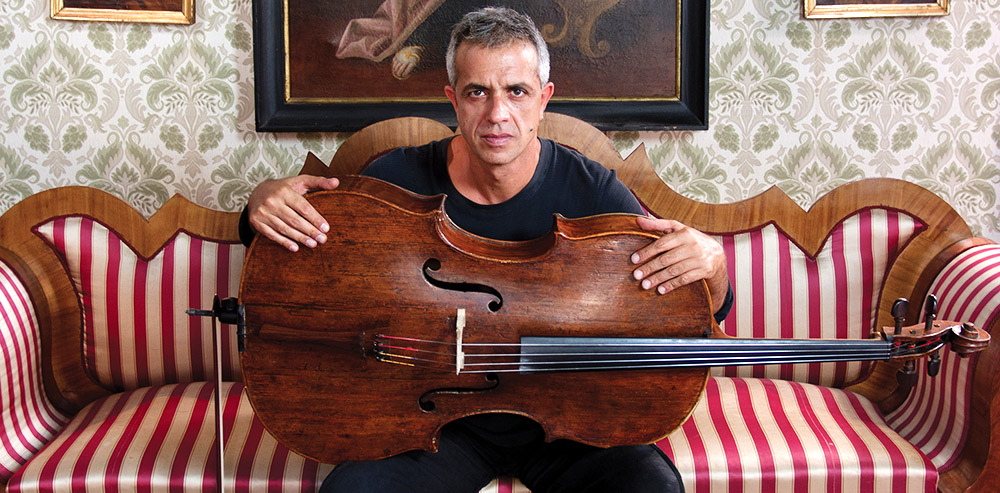100 CELLOS

100 Cellos è un ensemble di violoncellisti nato da una idea di Giovanni Sollima e Enrico Melozzi durante l’occupazione del Teatro Valle, storico teatro di Roma fondato nel 1727.
Il primo raduno di un centinaio di violoncellisti avviene appunto al Teatro Valle occupato, nel marzo 2012, grazie ad un passaparola su internet diffuso attraverso i canali social. L‘esperimento, che inizialmente sembrava irrealizzabile, dà vita a tre giorni di sperimentazione e improvvisazione, durante i quali si definisce il carattere del progetto, e scaturisce nel grande concerto del 18 marzo in un Teatro Valle gremito fino all’ultimo posto disponibile. Dopo quel primo evento l’ensemble inizia il suo cammino che lo porta nel giro di pochi anni nei teatri e nelle piazze di tutta italia, in europa e nel mondo, con concerti quasi sempre sold-out, mantenendo sempre le sue caratteristiche originali di orchestra aperta e “trasversale”, formata da grandi professionisti, solisti di fama, studenti, amatori e appassionati.
100 Cellos è un gruppo collettivo fluido in costante evoluzione, formato da una base di partecipanti storici e si arricchisce di nuovi membri convocati e arruolati in ogni nuova località raggiunta. In occasione di ogni evento, oltre al grande concerto finale, il gruppo di violoncellisti coinvolge la città ospitante con concerti ed eventi collaterali, flash mob, incursioni imprevedibili nelle strade e piazze.
Il repertorio spazia attraverso tutte le epoche e gli stili, nelle composizioni, arrangiamenti e nella direzione a quattro mani di Sollima e Melozzi che si alternano sapientemente tra i ruoli di solista e direttore.
Sul palco insieme ai 100 Cellos in questi anni si sono esibiti grandi artisti come: Premiata Forneria Marconi, Sarah Jane Morris, Marco Mengoni, Alessandro Baricco, Stefania Rocca, Valeria Solarino, Ernest Reijseger, Rushad Eggleston, Elsa Lila, le Voci della Notte della Taranta, Michael Riessler, Marina Bartoli, Davide Shorty, Miguel Angel Berna, Manuela Adamo, Peppe Vessicchio, Sergio Beercock, Lucymay Di Stefano.
GIOVANNI SOLLIMA

Giovanni Sollima è un violoncellista di fama internazionale ed è il compositore italiano contemporaneo le cui opere sono più eseguite al mondo.
Ha collaborato con Riccardo Muti, Yo-Yo Ma, Ivan Fischer, Viktoria Mullova, Ruggero Raimondi, Mario Brunello, Kathryn Stott, Giuseppe Andaloro, Toni Florio, Yuri Bashmet, Katia and Marielle Labeque, Giovanni Antonini, Ottavio Dantone, Patti Smith, Stefano Bollani, Paolo Fresu, Antonio Albanese, e con
orchestre come la Chicago Symphony Orchestra, Manchester Camerata, Liverpool Philharmonic (Artist in Residence 2015), Royal Concertgebouw Orchestra, Moscow Soloists, Berlin Konzerthausorchester, Australian Chamber Orchestra, Il Giardino armonico, Cappella Neapolitana, Accademia Bizantina, Holland Baroque Society, Budapest Festival Orchestra.
Ha composto musiche per Peter Greenaway, John Turturro, Bob Wilson, Carlos Saura, Marco Tullio Giordana, Peter Stein, Lasse Gjertsen, Anatolij Vasiliev, Karole Armitage and Carolyn Carlson. Sollima si è esibito al Alice Tully Hall, Knitting Factory, Carnegie Hall (New York), Wigmore Hall, Queen Elizabeth Hall (London), Salle Gaveau (Paris), Teatro alla Scala (Milan), Opera House (Sidney), Suntory Hall (Tokyo).
Dal 2010 insegna all’ Accademia Nazionale di Santa Cecilia a Roma. Nel 2012, insieme a Enrico Melozzi, ha creato il progetto 100 Cellos. Nel 2015 ha composto il logo sonoro dell’Expo di Milano ed ha inaugurato il nuovo spazio museale per la Pietà Rondanini di Michelangelo.
Giovanni esplora diversi generi musicali utilizzando strumenti antichi, orientali, elettrici e strumenti inventati, suonando nel deserto del Sahara, sott’acqua, e con il violoncello di ghiaccio (Ice Cello).
La sua attività discografica inizia nel 1998 con Aquilarco, un CD prodotto da Philip Glass per la Point Music, che è stato seguito da altri dodici album pubblicati da Sony, Egea and Decca. Ha riportato alla luce le musiche di Giovanni Battista Costanzi, compositore del 18mo secolo, del quale ha registrato le Sonate e le Sinfonie per violoncello e basso continuo, pubblicate da Glossa. Nell’Ottobre 2018 ha ricevuto il Anner Bijlsma Award alla Cello Biennale di Amsterdam. Nel 2020 hanno debuttato le sue due ultime opere, Il Libro della Giungla e Acqua Profonda. Nel 2021 esce il film documentario N-Ice Cello sul suggestivo viaggio del violoncello di ghiaccio contruito da Tim Linhart. Giovanni Sollima suona un violoncello Francesco Ruggieri costruito a Cremona nel 1679.
ENRICO MELOZZI

Enrico Melozzi dopo il diploma in violoncello, nel 1999, è diventato assistente di Michael Riessler, con il quale ha collaborato a numerosi progetti come arrangiatore e produttore
artistico. Successivamente si è avvicinato alla musica contemporanea lavorando con importanti musicisti come: Sabine Meyer, Vinko Globokar, Jean Pierre Drouet. Nel 2002 ha debuttato come direttore d’orchestra all’Auditorium Parco della Musica di Roma con la sua opera su Oliver Twist. Dopo questa esperienza Melozzi ha iniziato a collaborare con vari registi e ha composto musiche per cortometraggi, lungometraggi e spettacoli teatrali. Il 2004 è stato l’anno della fondazione del duo di musica elettronica Lisma Project insieme al dj Stefano De Angelis. Nel 2007 ha fondato a Roma l’etichetta discografica indipendente Cinik Records.
Nel 2011 è stato invitato a suonare al Teatro Valle Occupato e, per l’occasione, ha lanciato la Vertenza Musica alla quale hanno aderito tra gli altri Stefano Bollani, Subsonica e Giovanni Sollima. Con quest’ultimo ha fondato il gruppo “100 Cellos” e si è fatto promotore della prima maxi-reunion di violoncellisti in Italia ed è riuscito a radunare più di 140 violoncellisti provenienti da tutto il mondo. Con i 100 colleghi, oltre ad essere salito sul palco del Concertone del Primo Maggio a Roma, è approdato anche alla Triennale di Milano, al Teatro Regio di Torino, alla piazza del Duomo di Budapest, al Ravenna Festival, al Circo Massimo di Roma, al Sumida Triphony Hall di Tokyo, all’Expo 2020 di Dubai.
In teatro ha collaborato a lungo con il regista Fausto Paravidino e con Roberta Torre per la quale ha composto le musiche, da lui eseguite in scena, per “Gli Uccelli” di Aristofane e per “Insanamente Riccardo III”. Per il cinema ha scritto colonne sonore premiate in festival nazionali e internazionali, come quella per “Il gioco” di Adriano Giannini, con il quale ha ricevuto il Nastro d’Argento. Nel 2011 ha scritto per la compagnia West Australian Ballet il balletto sinfonico in due atti “Pinocchio”, rappresentato successivamente in Europa dalla compagnia francese Ballet du Rhin. Nel 2016 ha fondato a Roma l’Orchestra Notturna Clandestina, di cui è direttore musicale. Per sostenere economicamente l’orchestra ha creato i “Rave Clandestini di Musica Classica”, maxi eventi in cui la musica classica è protagonista di un concerto di oltre 15 ore. Nel 2017 presenta al Teatro Regio di Parma la sua opera “Il Piccolo Principe”. Nel 2020 ha debuttato al Teatro Sociale di Como con “Opera Crime”, ovvero la prima opera interattiva al mondo, e ha collaborato con Elio e Rocco Tanica alla ricostruzione del quintetto perduto de “Le nozze in villa” di Gaetano Donizetti, andate in scena al Teatro Gaetano Donizetti di Bergamo. Nel 2021 é nominato Maestro Concertatore della Notte della Taranta, insieme alla cantautrice Madame, esperienza che culmina con il grande concerto in piazza a Melpignano. Nel 2022 collabona con il cantautore Niccolò Fabi come arrangiatore e orchestratore, per la realizzazione dell’album “Meno per Meno”, presentato con un grande concerto all’Arena di Verona insieme all’Orchestra Notturna Clandestina diretta dallo stesso Melozzi.
Dal 2023 crea e dirige il progetto della Notte dei Serpenti, dedicato alla musica e alle tradizioni d’Abruzzo.
Dal 2012 Melozzi partecipa al Festival di Sanremo come direttore d’orchestra per artisti come Achille Lauro, Gianluca Grignani, Mr. Rain, Pinguini Tattici Nucleari, Noemi, Fabrizio Moro, Anastasio, Fasma, Sethu, Giusy Ferreri e Junior Cally. Nel 2021 dirige i Maneskin con il brano “Zitti e buoni”, del quale cura gli arrangiamenti orchestrali, e con il quale ottengono la vittoria al festival. Nel 2024, alla sua ottava partecipazione, dirige tra gli altri Ghali, classificatosi al terzo posto.
